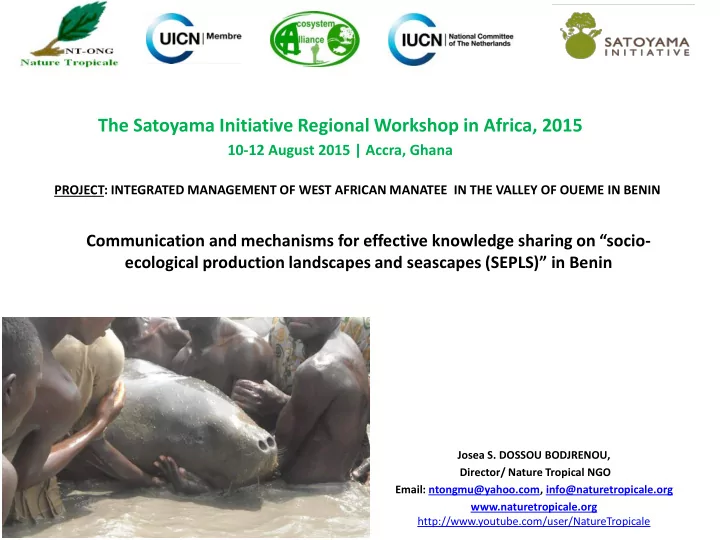

The Satoyama Initiative Regional Workshop in Africa, 2015 10-12 August 2015 | Accra, Ghana PROJECT: INTEGRATED MANAGEMENT OF WEST AFRICAN MANATEE IN THE VALLEY OF OUEME IN BENIN Communication and mechanisms for effective knowledge sharing on “socio - ecological production landscapes and seascapes (SEPLS )” in Benin Josea S. DOSSOU BODJRENOU, Director/ Nature Tropical NGO Email: ntongmu@yahoo.com, info@naturetropicale.org www.naturetropicale.org http://www.youtube.com/user/NatureTropicale
WHO IS NATURE TROPICALE NGO ? Founded in 1995, Nature Tropicale NGO is a non- profit organization whose mission is to promote the conservation and sustainable use of biological diversity, through information, education and awareness of different stakeholders and especially the youth. Since 2004, Nature Tropicale NGO is admitted as the first Beninese NGO member of the World Conservation Union (IUCN).
Museum of Natural Sciences
PRESENTATION OF THE LOCATION Study area : Delta of Oueme in Benin Republic. Benin is located on the West African coast between 6 ° 15 'and 12 ° 25' north latitude and between 0 ° 45 'east longitude 4 ° 00. Bounded: North: Niger River, Republic of Niger, Northwest: Burkina Faso West: Togo East: Nigeria South: Atlantic Ocean Elongated shape in latitude, Benin extends from north to south over a length of 700 km. Width varies from 125 km (along the coast) to 325 km (at the latitude of Tanguiéta). Area: 114,600 km² Population: 10 millions inhabitants.
PROBLEMS IN THE REGION The Benin Republic is facing great pressure on its natural resources resulting in a hazardous deterioration compromising nature. The wetlands ecosystem of Oueme Valley, a favourable habitat for the latest population of West African manatee is not the rest. These ecosystems and their resources are full threatened for various reasons such as the population explosion and their direct pressure on natural resources, the overexploitation of wood for energy, deforestation and impacts on sacred forests; the extensive agricultural in the bed of Oueme river; pollution; overfishing and use of destructive devices; the inadequate enforcement of regulations; the low technical capacity and weak governance and policy on natural resource management, the decline in living standards of local communities and climate change. The lack of basic education and transfer of knowledge from one generation to another coupled with ignorance of the need for sustainable management of resources, seriously threaten these.
SOLUTIONS To help improve the situation, Nature Tropicale NGO initiated with the support of local communities; the project for Integrated Management of the West African Manatee in the Valley of Oueme in Benin. The objective is to contribute to improve the livelihoods of poor communities through an integrated and participatory management of wetlands resources of the West African manatee migration corridor in the Oueme Valley. This project aims to raise awareness among local communities and authorities on the protection of wetlands ecosystems, their resources and environmentally sustainable alternatives, to strengthen their capacities as well as young, preserve and restore the ecosystems, encourage effective and mitigation to climate change adaptation, to develop alternative activities generating benefits to local communities and to improve governance in the natural resource management and synergy actions between actors. The strategy for achieving results is very participative and led to the empowerment of stakeholders on the management of their natural resources mainly through various types of media including television broadcasting.
ZONE OF THE ACTIONS
WHY THE OUEME WETLANDS ?
WHY ECOMAPPING? The Ecomapping is a process that allows local and indigenous communities to: • develop the skills and knowledge of communities by producing their own maps, • document their knowledge and use it to negotiate with the government, potential resource users (companies, conservation organizations ...) • develop an accurate database of endogenous use of resources and their location in an ecosystem; • help policy makers to plan for the sustainable use and management of resources taking into account the interests and rights of local communities and involving them; • contribute to the sustainable management of ecosystems and natural resources necessary for the well-being of local communities so that they do not harm the environment and endanger their future and their culture; • prevent and resolve conflicts of access and use of land and natural resources through dialogue between stakeholders.
PROCCESS OF ECOMAPPING Public awareness campaign with the communities in the project area
LEADERS ENGAGMENT ** Particpatory video ** Use of GPS (Global Positionning System) ; ** Laptop (Ordinateurs portables) ; ** Maps of the area ** Prospectus on the project ** Legal documentation (regulations, Laws) Participatory video is a tool
RESULTS
RESULTS Visit of sacred sites along Oueme river , use of GPS by local communities and stories telling by elders
COMMUNITY MAPS Community Ecological Calendar in the Wetlands zone Community Map of the resources in the area
DEVELOPMENT OF FAMILY SUSTAINABLE AGRICULTURE IN THE WETLANDS 0F THE SOUTHERN BENIN
AUDIOVISUEL PROGRAMME Taking advantage of this project supported by Ecosystems Alliance and the Dutch Committee for IUCN, an advocacy undertaken by the audiovisual team of Nature Tropical NGO has given pride of place to the environment, nature and biodiversity on the organs release in Benin. The BB24 television position in its program schedule, 15 to 30 minutes for the Environment (Morning - Environment) every day from Monday to Friday between 8:00 and 9:00 and 52 min every Wednesday from 21:00 to 22:00 for a debate on environment.
THANK YOU FOR YOUR ATTENTION
Recommend
More recommend